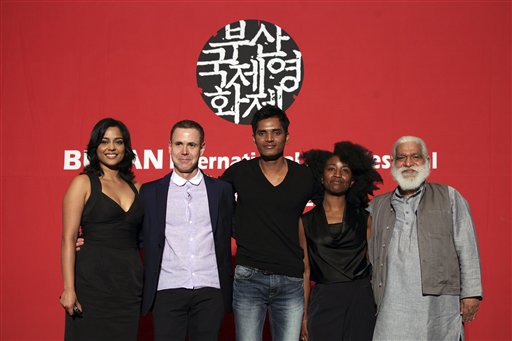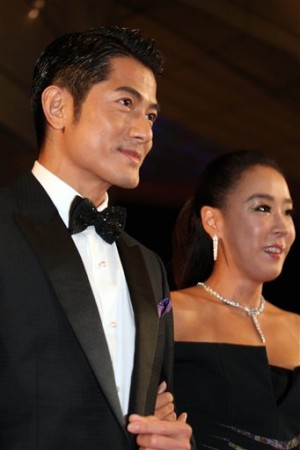Busan film fest grows on goodwill of Asia’s stars

Producers and actors of Busan International Film Festival’s opening movie “Vara: A Blessing,” from left, Indian actress Shahana Goswami, American producer David Urrutia, Indian actor Devesh Ranjan, American producer Nanette Nelms and Indian executive producer Suresh Jindal pose for photographers at a press conference at Busan Cinema Center in Busan, south of Seoul, South Korea, Thursday, Oct. 3, 2013. “Vara: A Blessing” is the third feature film by Bhutanese lama and filmmaker Khyentse Norbu. AP
BUSAN, South Korea — What would be the price for hiring Asia’s biggest movie stars to host the region’s largest film event?
Hong Kong star Aaron Kwok opened this year’s Busan International Film Festival for mere 500,000 won or $465, according to Yang Heon Kyu, who oversees the festival’s budget. In 2012, actress Tang Wei accepted the same condition and became the first Chinese to open the festival in South Korea’s second-largest city.

South Korean actress Han Soo Ah arrives to attend the opening ceremony of the Busan International Film Festival at Busan Cinema Center in Busan, south of Seoul, South Korea, Thursday, Oct. 3, 2013.
The goodwill of big-name stars is one indication of how important Busan has become to the Asian film industry in less than two decades.
It is not just actors. Lee Chang-dong, whose “Poetry” won the Best Screenplay at the 2010 Cannes Film Festival, is receiving 1 million won ($928) as a dean for the 18-day-long Asian Film Academy. Other veteran filmmakers received 300,000 won ($278) or less for leading three to four classes to novice filmmakers.
“Dean has to buy a dinner for students,” said Yang, explaining that the dean’s higher pay is due to the Korean custom. China’s Jia Zhang-ke and Iran’s Abbas Kiarostami are among acclaimed filmmakers who have been instructors at Busan in past years.
Article continues after this advertisementThe festival also has nearly 900 volunteers to assist audiences, screen movies, sell tickets and ensure subtitles are in place while getting paid less than $10 a day during the 10-day festival.
Article continues after this advertisementVolunteers are a staple of film festivals around the world, though the sheer number of them at Busan is unusual.
“There’s almost no film festivals with so many volunteers like here,” said Kim Ji-seok, the festival’s executive programmer. “It is one feature of Korean culture.”
The Busan festival still has become one of the most important events in the Asian film industry, drawing more than 200,000 visitors last year. China and Japan are the world’s second- and third-biggest film markets, and South Korean entertainers are regional superstars, heightening the international interest in the festival.
Organizers said Busan found a niche as a non-competitive movie festival. It can invite the year’s award winners from the top competitive festivals — Cannes, Berlin and Venice, Italy. Tickets for “Stranger by the Lake” and “Adele: Chapter 1& 2,” both from Cannes, were highly-sought in Busan, partly because their nudity and explicit sex scenes were expected to make local releases tough.

Chinese actor Aaron Kwok and South Korean actress Kang Soo-yeon arrive at the opening ceremony of the Busan International Film Festival at Busan Cinema Center in Busan, south of Seoul, South Korea, Thursday, Oct. 3, 2013. AP
Busan also distinguished itself from older festivals by helping unearth new talents in Asia. Out of 301 movies from 70 countries selected for this year, 94 movies were created by first- or second-time filmmakers. The festival opened last week with a drama by Khyentse Norbu, a Buddhist monk from Bhutan, and closes with “The Dinner,” Kim Dong-hyun’s independent feature made outside the local studio system.
The festival coincides with events such as Asian Project Market and Asian Film Academy, so new cineastes can meet with veteran moviemakers, investors and sales officials from around the world and launch their careers.
Thai filmmaker Sopawan Boonnimitra, co-director of “The Isthmus,” said she hoped her debut feature would be screened in Busan because she wanted to see reactions from Korean audiences. Her film is one of 12 competing for the $30,000 New Currents awards that fund two first- or second-time Asian filmmakers.
“Local movie-goers can see award-winning works from Cannes and Berlin in the past year and foreign audiences can see all Asian and Korean movies,” said Lee Yong-kwan, the festival’s director.
Busan’s budget for this year slightly increased over last year’s to 12.5 billion won ($11.6 million) thanks to increased corporate sponsorship. That is larger than Tokyo International Film Festival, which operated on a $7 million budget last year, and a festival in Hong Kong which had a $5 million. Busan city government has been contributing about half of the film festival’s annual budget for years while the Seoul government offered 1.5 billion won in 2013.
Even though love of Asian cinema and goodwill of stars and volunteers have helped drive the festival’s growth in the last 18 years, the organizer admitted it would face growing pressure to return their labor with a proper reward.
“People work for the festival because of their passion for film but they don’t get paid much,” said Yang.
Originally posted at 4:10 p.m.